In Search of the Perfect Boat
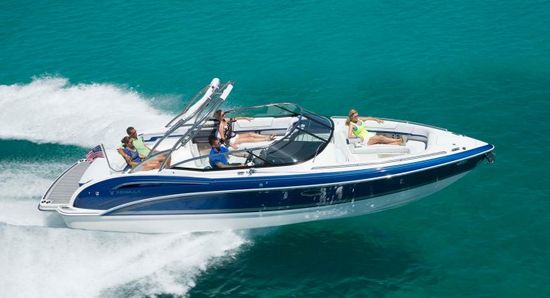
The fact of the matter is, there’s no such thing as the perfect boat. The model that’s ideal for one boater might be completely inappropriate for another. And the boat that’s perfect in the eyes of a boater who wants to go fishing may not be so perfect when that same skipper wants to take the kids water skiing or wakeboarding. The point is, all boats have their own ups and downs relating to each way they are used. The trick is for each boater to find the boat that best fits his or her personal needs, and is as specialized or as wide-ranging as his or her own interests. BoatTEST.com can help simplify this search, with a general guide to the many different types of boats and the pros and cons of each that may make them perfect, or not so perfect, for any boater.
Aluminum Boats & Skiffs
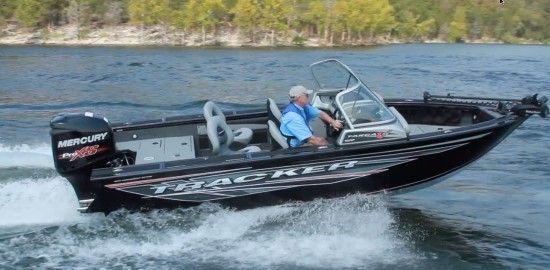
These simple boats provide a small, wide-open platform usually used for hunting or fishing. They’re one of the most popular types of boats around, and thanks to high demand on the used market, aluminum skiffs retain their value better than many other types of boats.
The Pros:
- Aluminum skiffs are about the least expensive boats on the water.
- Thanks to their simple design, they can be used for just about anything—fishing in all types of waters, waterfowling (with the proper paint job, of course), or just cruising around the lake is no problem.
- Aluminum construction means they’re lightweight, require less power than similarly sized fiberglass boats, are easy to trailer, and are easy to launch and retrieve.
- Long term maintenance costs are extremely low.
The Cons:
- Aluminum boats aren’t the best for handling large waves, nor open waters.
- They have little in the way of creature comforts, and even less in the way of protection from the sun and weather.
- Since they’re light, they tend to get blown around easily, which may make use in a breeze difficult.
- Many boaters prefer the look of fiberglass boats.
Bowriders
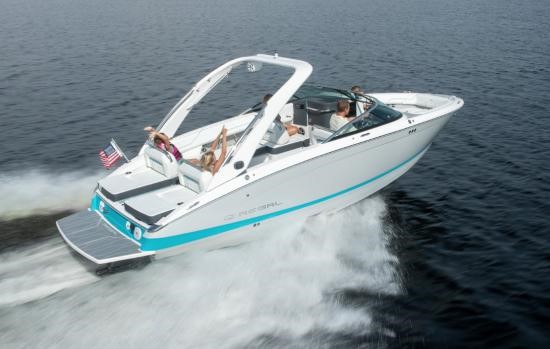
When it comes to playing around on the water, bowriders rule. They offer maximum seating, easy accessibility to the water, and peppy performance. There are a million choices of all sizes and prices out there, and many new boaters start out by buying a boat of this design.
The Pros:
- Gobs of comfy seating await family and friends.
- A wide range of options are available, from stereos to tow-towers to different sizes and types of powerplants.
- Most have large swim platforms and aft-facing seats, so they’re ideal for towing water toys and wakeboards.
The Cons:
- These boats aren’t usually designed with fishing in mind, and won’t be the first choice for sportsmen.
- While there is a wide range available, pricing tends to be higher than on simpler boats with fewer creature comforts.
- They offer little protection from the sun and weather.
Center Consoles and Bay Boats
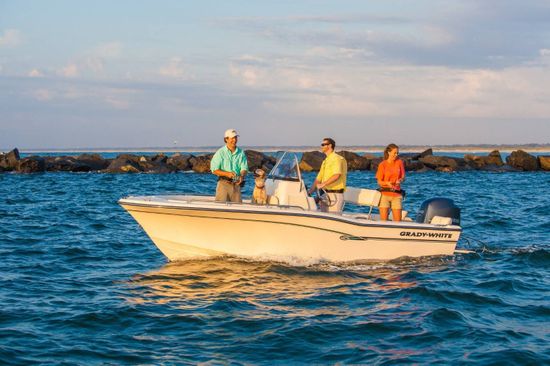
By placing the steering system in the middle of the boat, a center console offers the most useable deck space of just about any design. They’re available in both aluminum and fiberglass, and though most people think of center consoles as fishing machines, truth be told they’re also awesome for many other uses. In fact, thanks to comfort-adding touches like T-tops and console head compartments, the center console makes an excellent family boat even for those with small children.
Bay boats are a sub-category of center consoles. They usually have large, open casting decks both fore and aft, and lower angles of deadrise in the hull to reduce draft and increase stability. While this makes them better for fishing inshore, it also means that many bay boats don’t handle seas quite as well as center consoles with deep-V hulls.
The Pros:
- Maximum deck space means maximum fishability. Plus, putting the steering station and T-top in the center of the boat provides 360-degree fishing action.
- Center consoles are available in both aluminum and fiberglass, in all sizes and price ranges.
- Larger models are usually built on deep-V hulls, and are ideal for offshore use; bay boat models have less deadrise in the hull and are ideal for inshore waters.
- Commonly, center consoles over 21' (6.4 m) in length offer a head compartment inside the console. Versions with and without bow seating are available, so you can choose to make a center console as comfort/family-oriented as you choose.
- Most come with a good selection of fishing and family accouterments built-in. Coolers, comfortable, flexible seating, livewells, tables, rod holders, freshwater pull-out showers, rod stowage racks, cutting boards, and the like are all usually present.
The Cons:
- This design doesn’t maximize seating, so it may not be ideal for cruises or sight-seeing with large numbers of people aboard.
- Many center consoles designed to handle larger, open bodies of water require large powerplants, big fuel tanks, and lots of draft.
- Larger boats are also heavy and require large tow vehicles.
- Larger models built on deep-V hulls are not ideal for inshore use; bay boat models with less hull deadrise are better in protected waters.
Cruisers
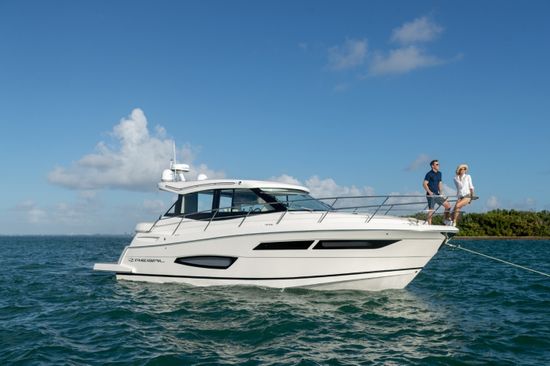
The term “cruisers” covers a lot of territory, and can be used to describe a 20-something boat with a small cabin and galley to yachts costing a million dollars and up. Obviously, there’s a lot of variation in this mix. Still, there are some generalities that apply to the genre as a whole.
The Pros:
- A cabin with sleeping accommodations means weekending or even extended cruising is possible.
- Most versions have large fuel capacities and significant range, so long adventures to distant ports can now be part of a cruising repertoire.
- Since cruisers are usually larger in nature than most of the other boat types, they offer a much higher level of comfort and luxury.
- All cruisers have some form of galley, so boaters can entertain with hot meals aboard.
The Cons:
- Cruisers can be expensive to buy, plus the cost of dockage or mooring, fuel, and maintenance can also be quite substantial.
- Depending on size, a cruiser may be unable to transit certain waters due to draft constraints and/or bridge clearance.
- Cruisers may lack features that allow family and friends to enjoy watersports, fishing, or other activities.
Dual Consoles
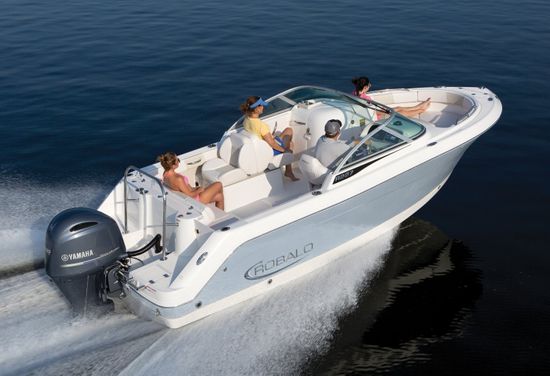
The combination of an open aft cockpit and a bow with seating, similar to that of a bowrider, gives the dual console excellent versatility. In fact, many dual consoles are essentially bowriders that are designed to offer some level of fishability and/or watersports. While the design may not be ideal for any one activity, it does a good job for virtually every type of activity.
The Pros:
- The dual console design provides windshield protection for both the captain and at least one other passenger.
- Bow cockpits on most dual consoles offer additional seating, as well as a bit of extra fishing space.
- Many modern designs incorporate head compartments into the passenger-side console.
- Dual consoles are also good for watersports; models designed to do double-duty often carry the Fish ’N Ski designation, and offer things like tow pylons and swim platforms in addition to rodholders and livewells.
The Cons:
- A dual console can’t offer as much fishing space as a dedicated fishboat.
- A dual console usually doesn’t offer as much seating nor watersports accouterments as a bowrider or a dedicated watersports boat.
- Dual consoles that offer head compartments usually offer minimal deck space, as the consoles need to be more substantial, and it’s rare to see a head option on a dual console under 22' (6.7 m).
Pontoon Boats
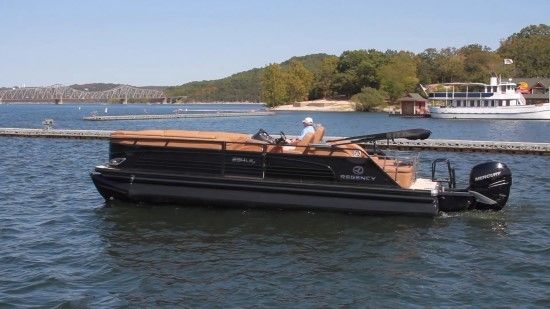
Pontoon boats are loved by many as both party barges and fishing platforms. Since they’re commonly built on a single-level wide-open deck, they’re highly customizable when it comes to seating, console, and layout arrangements, and boaters can usually choose to have a pontoon boat laid out however they like. Don’t worry about performance, either—up the ante to a tri-toon with a large powerplant, and lots of models offer speed and performance rivaling V-bottom boats.
The Pros:
- Their rectangular footprint makes for plenty of deck space.
- Some models are available in many versions that are inclined towards fishing, watersports, or just bumming around on the lake, yet still do all of these things well.
- Pop-up head compartments and Bimini tops are options on virtually all makes and models.
- They’re extremely stable, and rock and roll far less than V-hull boats.
The Cons:
- Large waves may roll over the deck, and pontoon boats are not ideal in waterways which are subject to significant seas.
- Load up a pontoon with all the options and seating and its price may climb out of range as well.
- Because of their high “fences” around the deck, many pontoons have high windage and get blown around quite a bit.
- Many pontoon boats turn flat as opposed to banking in turns, which can send coolers and gear—or in extreme cases, people—sliding across the deck.
How can boaters pick the specific type of boat that’s best for their family? It’s simple: list out all the things everyone regularly does afloat, and the things that same crew thinks they’d like to try. Consider each of the designs outlined here and the ups and downs of each. Now head for the boat shows, where boaters can compare a large number of boats side by side. Finally, boaters should choose the boat that satisfies both their hearts and brains — and we’re betting, they won’t regret their decision.